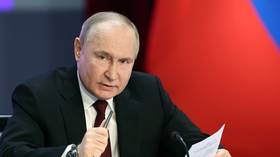Putin orders crackdown on illegal immigration

Russian President Vladimir Putin has instructed the country’s law enforcement agencies to crack down on illegal immigration and organized crime.
He issued the order during a meeting with senior officials from the Interior Ministry on Tuesday, when he said unauthorized migration often leads to extremism and criminality.
“I ask you to pay special attention to such priorities as ensuring public order, combating extremism, and suppressing illegal migration, as well as [to] cooperate with local agencies to neutralize organized crime,” Putin told the officials.
He said criminal groups often operate across borders and cooperate “with foreign intelligence services, [and] emissaries of international radical extremist structures.” Such organizations are also involved in human trafficking and drug smuggling, financial crimes and cybercrimes, the president said.
Existing databases are not sufficient to deal with illegal migration, he argued, adding that “modern digital electronic databases of biometric data are needed.”
The meeting with the Interior Ministry took place in the wake of the Crocus City Hall massacre, which occurred on March 22. At least 144 people, including three children, were killed in the attack, and more than 550 have been injured, according to the latest reports.
Russian security agencies will find the masterminds behind the terrorist attack on the concert venue in Moscow, Putin stated.
A total 12 suspects have been arrested in relation to the attack, including four alleged to have been directly involved in the shooting. These four are Tajikistani nationals, and had attempted to escape by car. The head of Russia’s Federal Security Service (FSB), Aleksandr Bortnikov, said they had been expected in Ukraine, and that the Ukrainian side may have been preparing to open a “window” to allow them to cross the border.
Islamic State Khorasan (ISIS-K) has claimed responsibility for the attack on the concert venue. However, Bortnikov suggested that the US, UK, and Ukraine may also be linked to the attack, possibly using radical Islamists as proxies. All three countries have denied involvement. Washington and Brussels have insisted that Kiev had nothing to do with the terrorist attack.












